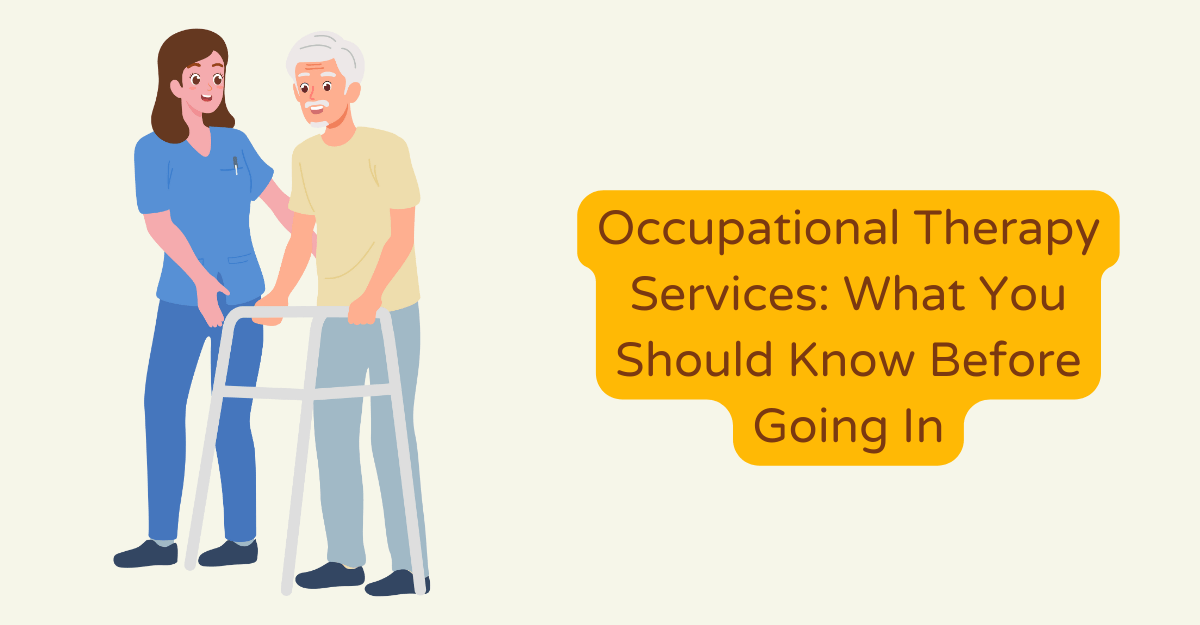
Occupational Therapy Services: What You Should Know Before Going In
If an accident, injury, or illness limits your participation in everyday activities, occupational therapy can offer assistance. These specialized therapists are health care professionals who assist people of all ages. By customizing environments and tasks to suit an individual’s needs, occupational therapists assist people living with disabilities or recovering from illness to live independent lives and recover as quickly as possible.
What is an Occupational Therapist?
Occupational therapy (OT) is a therapy approach that uses meaningful activities to assist people of all ages prevent, lessen, or adapt to disabilities. This process often includes teaching patients new ways of accomplishing everyday tasks and suggesting equipment such as wheelchairs and bathroom safety devices to make daily living simpler.
Teaching coping skills for physical or mental health issues as well as helping individuals return to independence through work or school programs or private practices. OTs work across a wide array of settings such as hospitals, schools, community outreach programs or private practice among other settings including hospitals, schools, community outreach programs or private practices and private practices.
People seeking occupational therapy (https://www.bls.gov/ooh/healthcare/occupational-therapists.htm) often come in because injuries or illnesses have severely impaired their daily activities. OTs can teach new strategies for dealing with their limitations and recommend adaptive devices like weighted handles, straps or reachers that make tasks simpler for patients to perform. They may even help reorganize homes or workplaces to increase access and decrease hazards.
They Work with People of All Ages
Occupational therapists can be found all around the world in various types of settings. From occupational therapy for autism to helping wounded soldiers adjust to life with prosthetic limbs, occupational therapists provide patients of all ages with tools necessary to effectively manage their disabilities in ways which meet their own specific needs and help them live a fulfilling life regardless of any limitations related to disability.
They typically work with people who have physical disabilities in a range of settings, including hospitals, community health centers, free clinics, schools and private practices. Their patients often require support and rehabilitation in managing everyday tasks such as bathing, cooking and dressing independently, meal prep preparation and attending work or school – OT’s utilize a wide range of techniques and apparatus to help their clients meet their goals and fulfill daily activities more easily.
Skilled professionals provide their clients with skills necessary to manage their conditions and enhance the quality of life, including teaching practical methods and techniques, helping regain independence and developing self-care and recreational programs. Furthermore, physical alterations may be suggested in homes or workplaces in order to make them more accessible and safer.
They Help People with Physical Disabilities
An individual with physical disability shouldn’t let that stop them from leading an active and fulfilling life; occupational therapy can assist. By employing techniques, exercises, and apparatuses to teach basic daily tasks more efficiently and decrease effort needed to perform them, OTs help people increase functional capabilities as they discover alternative means to complete those tasks more easily.
Occupational therapy can be invaluable for individuals who have lost use of limbs due to an injury or illness, as well as individuals living with mental health conditions like dementia and depression. The skills learned during OT sessions like these can be applied throughout all aspects of life including work and home settings – this often reduces hospital visits or delays nursing home admissions.
As part of their practice, occupational therapists frequently suggest the use of assistive equipment and suggest changes to home environments such as sit-to-stand desks or work pacing to improve mobility while decreasing workplace accidents which could otherwise incur extra expenses and time off work. These changes not only increase an individual’s mobility but may also decrease risk and avoid costly accidents in the workplace that could potentially require costly legal proceedings and time off work for recuperation.
They Help Those with Mental Health Problems
Occupational therapy services can assist people in managing mental health conditions such as anxiety and depression by working together on developing effective coping strategies, providing support and training both at home and at work, as well as offering help for better managing daily activities and relationships with others which can be a difficult task, for some.
Occupational therapy differs from other healthcare professions by treating each person holistically (https://www.quora.com/What-is-the-meaning-of-the-word-Holistically) to reach their personal goals in life, whether that involves helping recover from injuries or illnesses, returning them to work or leisure activities they love, or meeting family and friend needs.
Occupational therapists can be particularly beneficial to people living with mental health issues in living more fulfilling lives, breaking the vicious cycle that often comes with mental illness: lack of occupation leads to lower self-esteem and withdrawal from activities that give purpose and meaning in their life. Thus, OTs contribute to providing holistic mental health care.






